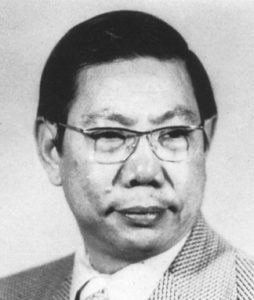© 2024 Corcept Therapeutics, Incorporated
To celebrate Asian American and Pacific Islander (AAPI) Heritage Month, we honor trailblazing Chinese American medical oncologist Dr. Min Chiu Li (1919–1980), who forged a new paradigm for chemotherapy. He was the first scientist to utilize a circulating tumor biomarker to inform successful cancer treatment, which led to complete regression of metastatic choriocarcinoma in multiple patients – a highly malignant cancer of the placenta.
Early Career
After studying at Mukden Medical College in present-day Shenyang, China, Dr. Li came to the United States in 1947 for additional medical training at University of Southern California, Rush University Medical Center and Memorial Sloan Kettering Cancer Center.
Dr. Li took an assistant obstetrician position in the laboratory of Roy Hertz at the National Cancer Institute (NCI), where he channeled his determination to find a cure for choriocarcinoma after watching women die in terrible pain from the cancer at Sloan Kettering. At NCI, Dr. Li continued the research he began in New York experimenting with methotrexate as a cancer treatment. Dr. Li’s research enabled a seminal discovery in biomarker science: levels of the hormone human chorionic gonadotropin (hCG) could be used to measure cancer treatment efficacy.
Biomarker Science Pioneer
At NCI, Dr. Li set out to prove his hypothesis that chemotherapy’s efficacy in shrinking tumors could be monitored through urine hCG levels. Dr. Li’s clinical work was controversial because he insisted that patients with high residual hCG levels should continue to receive chemotherapy along with their methotrexate treatment until the biomarker reached normal levels, even after appearing to be in complete remission. The NCI administration expressed its disapproval of continuing chemotherapy in patients in remission and ultimately terminated Dr. Li’s position. However, Dr. Li’s clinical studies ultimately showed those who stayed on chemo until their hCG levels returned to normal were cured. For this achievement, he was awarded the prestigious Lasker Prize for clinical medical research in 1972.
Cancer Legacy
Dr. Li’s research at NCI was historic in many ways. He was the first scientist to deploy a circulating tumor biomarker to inform successful cancer treatment, the first to show that a combination treatment with multiple chemotherapies could send metastatic cancer into lasting remission, and the first to cure gestational choriocarcinoma resulting from pregnancy. Prior to Dr. Li’s research, 90% of women who developed choriocarcinoma died within a year. Thanks to his contributions, today this form of placental cancer can be cured in almost every case without surgery by using biomarker-driven combination therapy.
His work as a pioneering medical oncologist continued throughout his illustrious career. In 1960, he demonstrated that metastatic testicular cancer could be treated with chemotherapy. As director of medical research at New York Nassau’s Hospital in the 1970s, he showed that the drug fluorouracil improved the survival rates of colon cancer patients after surgery.
We are proud to honor Dr. Min Chiu Li’s contributions to the oncology space.
Sources:
New York Times, Jane Brody
“16 Win Lasker Award for Cancer Work”
Lasker Foundation
Combination chemotherapy for lymphoma and acute leukemia – Lasker Foundation
Cancers (Basel) 2022 May 16;14(10):2450, Suzann Duan, Iain L O Buxton
Evolution of Medical Approaches and Prominent Therapies in Breast Cancer
https://pmc.ncbi.nlm.nih.gov/articles/PMC9140094/
The NIH Catalyst, Volume 31 Issue 5, September–October 2023, Victoria Tong
70 Years Onward, the NIH Clinical Center Remains a Beacon of Hope | NIH Intramural Research Program
Clinical Cancer Research, Freireich, EJ
”Min Chiu Li: a perspective in cancer therapy”
Chinese American Medical Society, Li, John K.
CAMS at 40: 1963-2003, a History of Chinese American Medical Society
The Emperor of All Maladies: a biography of cancer
Mukherjee, Siddhartha

